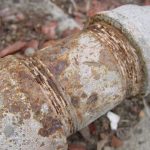Water damage is insidious. It can occur at a low level over a prolonged period of time or very quickly. This type of damage is also expensive to fix, and it can even damage the foundations of your home. In extreme circumstances, damaged concrete can result in a localized sinkhole. But, this type of damage can be averted or repaired if you can notice the danger signs.
Understanding Concrete Pores
Most people think of concrete as a solid block of material, but this is incorrect. Despite its obvious strength as a building material, concrete contains hundreds of thousands of tiny imperfections. The most numerous type of imperfections are pores that can allow water to enter and get under the surface of the concrete. Over time, this can break the concrete apart, and this is a major issue for concrete structures built near the coast. This is because salt water is more corrosive than water that we get from rainfall. So, even if a section of concrete looks intact, there could be damage from water that you cannot notice with a casual glance. But, sometimes the damage is very obvious if you know what to look for.
3 Obvious Signs of Concrete Water Damage
If you have an externally located faucet that drips constantly onto a concrete surface, you may not notice any signs of damage. But, it’s important to get that leak fixed quickly as a precautionary measure. That being said, there are three obvious signs of concrete water damage, and these need to be taken seriously, they are imperfections, cracks, and stains.
- Imperfections: When concrete is poured, it can have rough patches, and this is especially true in areas where it will be hidden. Finishing the surface to a high standard isn’t necessary for many areas of the home. But, if you do have rough patches of concrete that seem to be getting rougher over time, this could be a sign of water damage. If you look closely, you may notice that cracks are forming near the surface, which indicates larger cracks deeper in the concrete.
- Cracks: Obviously, if there are cracks in the concrete that are lengthening or getting wider, this is a cause for concern. Evaluating and repairing cracks should be a priority because they will only get worse over time. Broken sections of concrete can undermine the foundations of your home, leading to massive damage.
- Stains: These are specifically water stains that are typically found running down from a basement ceiling. Gradually these water stains will spread as the pores of the concrete become saturated with the release of water. Water stains are a sure sign that you have a water leak, and water damage is expensive to fix if you don’t act quickly.
An Earlier Fix is Essential
The process of concrete degradation due to water exposure can be a very long process. For this reason, many homeowners make a critical mistake. They put off a repair because it’s inconvenient, and they want to “save money.” But, if you have noticed a water leak using the aforementioned advice, it’s important to take action earlier rather than later. A concrete repair can be time consuming and expensive, but it is essential if you want to secure the integrity of your home. Like most things in life, concrete damage only gets worse over time, and fixing it earlier will cost less.
Concrete Repair Options
Many people have developed solid DIY skills over the years, and they will be tempted to attempt a repair. This typically involves some kind of patch job to cover the area of damaged concrete or fill an obvious crack. But, this will not work, the damage will always resurface, and the underlying cause of the water damage is not fixed. A simple fix may be possible if the water damage is in a very localized area and it’s fixed quickly. But, the water leak that’s causing the concrete damage must be located and fixed by your local certified plumber. In some cases, the water damage is caused by a poor installation during construction or a remodeling project.
3 Ways to Find Hidden Water Leaks
Adopting a proactive approach makes good sense, and concrete damage can be avoided if you’re aware of the condition of your plumbing. A leaky faucet isn’t likely to create a sinkhole under your home, but all water leaks should be fixed quickly. If you have a home older than 25 years, you need to contact a plumber and ask them to check the pipes, connections, and fixtures for water leaks. Hidden water leaks are hard to find, but it isn’t impossible if you know what to look for.
- Higher Water Bills: When you start to pay closer attention to your water bills, you can notice trends. Of course, we expect our water bill to rise when we have visitors, but if it is steadily rising during normal water use, this is a sign that something is wrong. Water leaks tend to get worse over time, and more water is released into the home.
- Check the Water Meter: To get an accurate picture, you can carry out a check on your water meter to find the scale of your water leaks. Start by turning off every faucet, fixture, and appliance in your home and make sure they are not used during your check. Take a water meter reading to see if it’s still moving and if it is; you have a fast water leak in your home. If the water meter doesn’t change, leave it for a couple of hours and take another reading. If the water use has increased, you may have a slow water leak.
- Toilet Dye: Place some food coloring in the water tank, wait ten minutes and see if it colored the water in the toilet bowl. If it does, you have a toilet leak, which can waste a lot of water in a single day.
If you’re worried about water leaks in your home, contact your local certified plumber today.
By Giovanni Longo President Flood Brothers Plumbing
Giovanni Longo is a 3rd generation master plumber who has been practicing his craft and trade in the greater Los Angeles area for well over a decade and a half. A plumbing and hydraulics-engineering innovator, Giovanni’s particular world-class expertise focuses on dealing with challenging sewer system designs as well as resolving complex commercial and residential draining issues. As a certified Flood Mitigation expert, he is also well versed in a wide variety of water damage and remediation solution.





